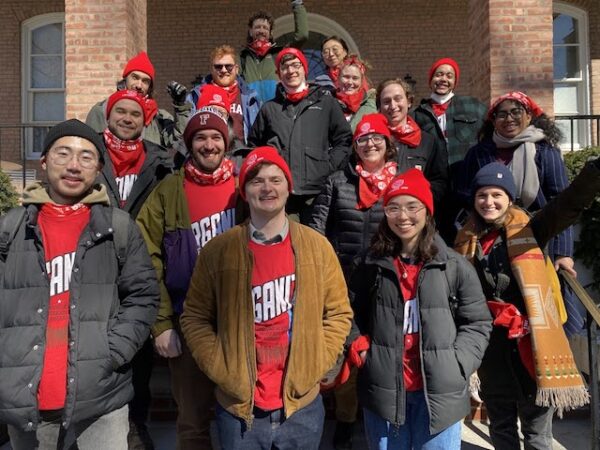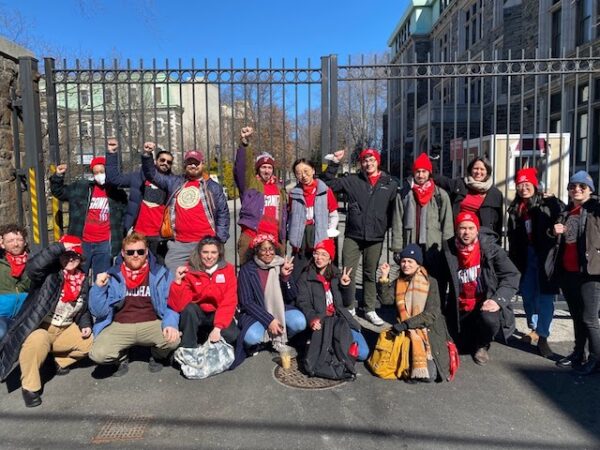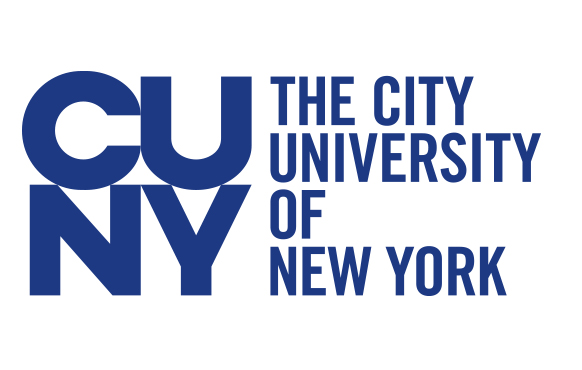NEW YORK, N.Y.—More than 350 graduate-student workers at Fordham University will vote this week on being represented by the Fordham Graduate Student Workers union. The vote will take place Tuesday, Apr. 5 at the university’s Lincoln Center campus in Manhattan and Thursday, Apr. 7 at its main campus in the Bronx.

The union’s first priority is a living wage, compensation “that reflects what we contribute to the university,” Mara Foley, a first-year Ph.D. candidate in theology, told LaborPress. At Fordham, third-year Ph.D. candidates teach many of the core classes required for all undergraduates at the Jesuit institution, such as Faith and Critical Reason — “the heart of a Fordham education,” Foley says. Those in earlier years are teaching assistants, help professors with research, and do administrative work. Yet their pay starts at about $26,000 a year, low enough so that an apartment in the Bronx could easily cost half their income, and they are also assessed fees of more than $1,000 a semester.
Another priority is getting better health-care coverage, which currently does not cover dental or vision care and has “pretty exorbitant” deductibles, Foley says.
And “just having a seat at the table” for major decisions such as whether to return to in-person teaching is important, she continues. A union contract would establish a formal grievance procedure and a process to record how many hours they’ve worked.
The union is also seeking paid parental leave, subsidies for child care, and legal protections for international students.
Foley says she was surprised by how quickly graduate workers responded. It took only two weeks in February for a majority to sign Fordham Graduate Student Workers union cards.

The union is affiliated with Communications Workers of America Local 1104, which already represents graduate-student workers at Stony Brook University on Long Island. United Auto Workers Local 2110 represents them at Columbia and New York University. At City University of New York, they are part of the Professional Staff Congress, American Federation of Teachers Local 2334, CUNY’s general union for faculty and staff.
Columbia resisted signing a contract for almost three years, not agreeing to a deal with Local 2110 until this January, following a 10-week strike. While the Fordham administration has not signed a formal neutrality pledge, it has not been antagonistic, Foley says.
“Fordham respects the rights of its graduate student workers to decide whether to form a union,” a university spokesperson told LaborPress. “The University wants to ensure a fair and free election and worked with the union to schedule an election.”
The university has stated that if the graduate students vote for the union, it “will respect that outcome and bargain in good faith.” On the other hand, it has also said it had hired the anti-union law firm of Jackson Lewis to offer advice about the election process, “a specialized area of law.”
A March 8, message from Provost Dennis C. Jacobs did not urge students to vote no. It just noted the “results will be binding on all eligible voters, regardless of how or whether they voted.”
“In 2018, when Fordham’s adjunct faculty formed a union, our President Fr. Joseph McShane called it ‘the ethical choice’ and noted that support for organized labor ‘has deep roots in Catholic social justice teaching,’” Benjamin Van Dyne, a graduate student in theology, said in a statement the CWA released after it filed a petition for the vote on Feb. 28.
The union and its supporters hope the university will follow the Jesuit principle of “cara personalis,” caring for the whole person, articulated by St. Ignatius of Loyola, who founded the Society of Jesus in 1541, and the Catholic social-justice principles set forth by Pope Leo XIII in “Rerum Novarum,” his 1891 encyclical on the rights and duties of capital and labor, which encouraged workers to form unions (though as a moderate path between the shoals of amoral capitalism and atheistic socialism).
“Wages ought not to be insufficient to support a frugal and well-behaved wage-earner,” Pope Leo wrote. “If through necessity or fear of a worse evil the workman accept harder conditions because an employer or contractor will afford him no better, he is made the victim of force and injustice.”
“That’s why we have a lot of hope that the university would be supportive, because it’s very much a Fordham value.” says Foley “I love Fordham and I love this community, and I’m really excited about what the future holds.”



